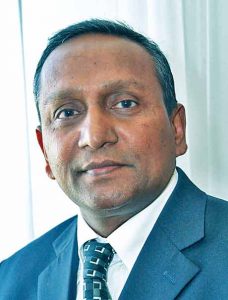I READ Mr Hydar Ally’s letter in the Chronicle titled ‘Ordinary Guyanese owning homes under the PNC was a distant dream’, and could relate to that as my own situation in those dreadful years showed. During the dark days of the PNC regime in the 1970s and 1980s, the political environment was extremely hostile to members of the various professions, including business and accounting.I was an Audit Leader and subsequently a Management Accountant at GuySuCo in those years, after successfully completing my ACIS and ACMA exams on my own (having been refused a scholarship three times by the Public Service Ministry).

My salary in 1981 was G$1,400 or US$545 (G$2.5659 = US$1 back then). With my spouse’s income of $120 per month, and after taxes, we netted $1,135. Twice a week, I had to line up at a KSI in Goed Fortuin, run by a fierce-looking PNC thug, for basic food items like cooking oil, sugar, salt, soap, butter, cheese, and flour. That was the level of degeneracy and indignity that ordinary hard-working Guyanese were brought to.
My monthly expenses amounted to $825 and were made up of groceries, rent, babysitting, electricity, transportation clothes, helping our aged parents and siblings who were not working, giving a little to the church, and saving what was left (if any at all). Rent was $120 for a 2-room downstairs flat at Vreed-en-Hoop and that was considered cheap. When all the deductions were made, we were left with $300. All my savings from the past years were spent towards books, fees, and examination costs to earn the ACIS and ACMA.
I still remember writing to publishers in both the U.K. and U.S. asking to send pro-forma invoices for textbooks and past examination questions and answers booklets in order to take to the Bank of Guyana for approval to buy bank drafts at a commercial bank as foreign exchange was strictly controlled.
As a result, I had very little equity as a down payment for a house which was but a dream then, as Mr Ally so well-articulated in his piece. To compound the problem, inflation and interest rate were running in the double digits. As an example, here is a scenario of an uphill battle I faced. An executive from GuySuCo was willing to sell me his home at Nandy Park for G$65,000 or US$25,000, in 1981 as he was moving overseas, like so many back then. The monthly mortgage payment would have been G$900 plus home insurance of $200 totalling $1100 which was impossible to sustain with a monthly saving of $420 (if you add back the rent). And my remuneration was considered top of the line at that time.
Realising that it was hopeless and I could never own a home in Guyana, I turned my energies to helping others who were far worse off than I was. I pitied those who were earning far below me and who wanted to pursue business and accounting badly but did not have the resources, self-motivation and guidance.
My father had desks, benches, and a blackboard at his house in Goed Fortuin, as he taught Hindi and Sanskrit classes. So, I used those facilities and gave free lessons and student counselling under that very house (which still stands today) to anyone (regardless of party affiliation, ethnicity, or religion) studying for the LCC, ATT (now CAT), and the Foundation levels of the professional accounting programmes. There are a few fully qualified accountants still in Guyana who could attest to this. Even a top civil servant (a die-hard PNC) from the Ministry of Home Affairs got wind of my generous offer and came all the way from Georgetown to attend my sessions. I trust he is reading this letter. Today in Guyana, in an open market economy where there is so much freedom we take for granted, ordinary Guyanese can easily afford their own homes. Also, there are business and accounting students who can afford attending private schools or pursue correspondence courses not only the UK programmes, but those from the U.S. and Canada as well, and there are no restrictions over foreign exchange.
But despite the hardships back in the 1970s and 1980s, I never discounted nor denied the country of my birth and I am still devoted to helping my poorer countrymen and feel proud to continue to serve Guyana from Toronto through my publications, and to make frequent donations to the libraries. Of note is the local chapter of the Institute of Internal Auditors I established in 2000 which continues to grow and professionalise internal auditing to contribute towards risk, control, and governance throughout the country. Could this have happened prior to October 1992. The answer is a resounding NO. However, those difficulties in the 1970s and 1980s should not be forgotten or easily discounted. Instead, case studies should be researched, documented, articulated, and serve as a reminder of the living hell that existed in Guyana before October 1992. In closing, here is an appropriate quote from music icon Paul Simon’s “Peace Like a River”:
“You can beat us with wires
You can beat us with chain
You can run lots of rules
But you know you can’t outrun the history train…”
LAL BALKARAN
Internal Auditor and Risk Consultant,
Toronto



.jpg)









